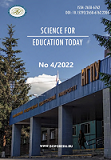Классное руководство как элемент социального воспитания российских школьников в контексте анализа исследований образования
Class tutoring in Russian schools as a part of social education: The analysis of educational studies
Author(s): Elena Vasilyevna Andrienko, Oksana Sergeevna Popova, Tatyana Aleksandrovna RommSubject(s): Sociology, School education, History of Education, Sociology of Education
Published by: Новосибирский государственный педагогический университет
Keywords: Socialization; Education; Social education; School; Class tutorship; School class; Class teacher; Tutor;
Summary/Abstract: Introduction. The author examines the development of the institute of class tutorship as an element of social education in Russia, taking into account the current problems of socialization of children and youth, as well as theoretical pedagogical concepts of Russian and international school education. The purpose of the article is to conduct a comparative analysis of approaches to moral and social education within various educational systems and identify the characteristic features of class tutoring in the comparative context. Materials and Methods. The research is theoretical in nature, including analysis, comparison and generalization of Russian and international conceptions of social education as a part of school education. The methodological basis of the research includes historical, socio-cultural, cross-cultural and axiological approaches which enable to consider the specifics of the development of class tutorship on the basis of historical analysis, taking into account social changes, the influence of changing requirements of the state and society, as well as the transformation of value orientations in the process of education development. Results. The paper describes the characteristic features of class tutorship as an element of social education within school education system on the basis of the identified trends in the development of this process in the historical aspect; defines the specifics of Russian educational approaches compared to similar phenomena in international school education; identifies the differences in the professional activities of the class teacher and tutor as subjects of psychological and educational support for students; reveals the interrelations and contradictions of the normative educational process and the socialization of students in the changing society. Conclusions. The specificity of class tutorship as an element of social education of Russian schoolchildren is determined by: professional activities of the teacher who carries out their work in strict regulatory restrictions within the centralization of the general education process; reliance on the creation of a relatively cohesive group of students (school class), which remains almost unchanged throughout the entire period of general school education; the desire of the class teacher to create a highly organized group – a collective based on the common activities, values and relationships of all participants of the educational process; maintaining a balance between individualization and collectivism to create appropriate opportunities for self-realization and self-development of the individual with the inevitable influence of group pressure.
Journal: Science for Education Today
- Issue Year: 12/2022
- Issue No: 4
- Page Range: 73-91
- Page Count: 19
- Language: Russian

